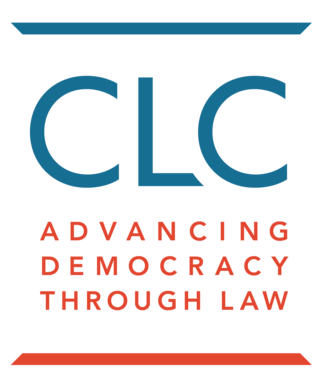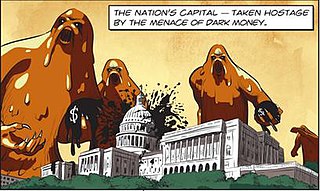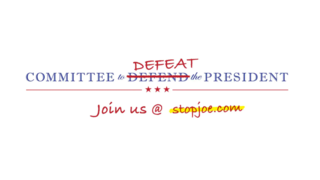In the United States, a political action committee (PAC) is a tax-exempt 527 organization that pools campaign contributions from members and donates those funds to campaigns for or against candidates, ballot initiatives, or legislation. The legal term PAC was created in pursuit of campaign finance reform in the United States. Democracies of other countries use different terms for the units of campaign spending or spending on political competition. At the U.S. federal level, an organization becomes a PAC when it receives or spends more than $1,000 for the purpose of influencing a federal election, and registers with the Federal Election Commission (FEC), according to the Federal Election Campaign Act as amended by the Bipartisan Campaign Reform Act of 2002. At the state level, an organization becomes a PAC according to the state's election laws.
A 527 organization or 527 group is a type of U.S. tax-exempt organization organized under Section 527 of the U.S. Internal Revenue Code. A 527 group is created primarily to influence the selection, nomination, election, appointment or defeat of candidates to federal, state or local public office.
The Federal Election Campaign Act of 1971 is the primary United States federal law regulating political campaign fundraising and spending. The law originally focused on creating limits for campaign spending on communication media, adding additional penalties to the criminal code for election law violations, and imposing disclosure requirements for federal political campaigns. The Act was signed into law by President Richard Nixon on February 7, 1972.

The financing of electoral campaigns in the United States happens at the federal, state, and local levels by contributions from individuals, corporations, political action committees, and sometimes the government. Campaign spending has risen steadily at least since 1990.
Citizens United v. Federal Election Commission, 558 U.S. 310 (2010), is a landmark decision of the Supreme Court of the United States regarding campaign finance laws and free speech under the First Amendment to the U.S. Constitution. The court held 5–4 that the freedom of speech clause of the First Amendment prohibits the government from restricting independent expenditures for political campaigns by corporations, including nonprofit corporations, labor unions, and other associations.

Campaign Legal Center (CLC) is a nonprofit 501(c)(3) government watchdog group in the United States. CLC supports strong enforcement of United States campaign finance laws. Trevor Potter, former Republican chairman of the Federal Election Commission, is CLC's founding president.
The term corporate donation refers to any financial contribution made by a corporation to another organization that furthers the contributor's own objectives. Two major kinds of such donations deserve specific consideration, charitable as well as political donations.

In politics, particularly the politics of the United States, dark money refers to spending to influence elections, public policy, and political discourse, where the source of the money is not disclosed to the public.
In the United States, the phrase testing the waters is used to describe someone who is exploring the feasibility of becoming a candidate for political office. It can also be used more generally as an idiom meaning to estimate the success of something by trying it out a little bit.
Fundraising plays a central role in many presidential campaigns, and is a key factor in determining the viability of candidates. Money raised is applied for the salaries of non-volunteers in the campaign, transportation, campaign materials, media advertisements and other contingencies. Under United States law, officially declared candidates are required to file campaign finance details with the Federal Elections Commission (FEC) at the end of every calendar month or quarter. Summaries of these reports are made available to the public shortly thereafter, revealing the relative financial situations of all the campaigns.

Correct the Record was a hybrid PAC/super PAC founded by David Brock. It supported Hillary Clinton's 2016 presidential campaign. The PAC aimed to "find and confront social media users" who posted "unflattering messages about the Democratic front-runner".
Colorado Republican Federal Campaign Committee v. FEC, 518 U.S. 604 (1996), was a case heard by the Supreme Court of the United States in which the Colorado Republican Party challenged the Federal Election Commission (FEC) as to whether the "Party Expenditure Provision" of the Federal Election Campaign Act of 1971 (FECA) violated the First Amendment right to free speech. This provision put a limit on the amount of money a national party could spend on a congressional candidate's campaign. The FEC argued that the Committee violated this provision when purchasing a radio advertisement that attacked the likely candidate of the Colorado Democratic Party. The court held that since the expenditures by the committee were made independently from a specific candidate, they did not violate the campaign contribution limitations established by the FECA, and were protected under the First Amendment.

FEC v. National Conservative PAC, 470 U.S. 480 (1985), was a decision by the Supreme Court of the United States striking down expenditure prohibitions of the Federal Election Campaign Act of 1971 (FECA), which regulates the fundraising and spending in political campaigns. The FECA is the primary law that places regulations on campaign financing by limiting the amount that may be contributed. The Act established that no independent political action committee may contribute more than $1,000 to any given presidential candidate in support of a campaign.

The Committee to Defeat the President was first established as the hybrid Stop Hillary PAC in 2013. The PAC changed its name to the Committee to Defend the President in 2017. Ted Harvey, a former Colorado state senator, chairs the committee.
Shadow campaigns refers to spending meant to influence political outcomes where the source of the money is not publicly disclosed or is difficult to trace. United States campaign finance law has been regulated by the Federal Election Commission since its creation in the wake of the Watergate Scandal in 1975, and in the years following Citizens United v. FEC, there has been a rise in outside special interest groups spending money on political campaigns in the United States. Dark money leaves voters uninformed about important political information and it can obscure potential conflicts of interest for judges and legislators alike.
A hybrid PAC is a political committee classification in the United States. It is used by the Federal Election Commission to describe a committee with certain spending and contribution limitations.

The AAPI Victory Fund is a Political Action Committee that focuses on mobilizing Asian American and Pacific Islanders (AAPI) eligible voters and supports Democrat AAPI candidates.
Red-boxing is a tactic used by American political candidates to coordinate with their political action committees (PACs) in a way that circumvents campaign finance laws. Political campaigns place statements or requests on public campaign websites which are then used by PACs to support the candidate. The name for the practice comes from the red-colored box that often surrounds the instructions for PACs on campaign websites. It is used by both major American parties, but was noted for its use by Democratic candidates in primary elections in 2022.
Save America is a leadership political action committee founded and controlled by former US president Donald Trump. It has been Trump's primary fundraising and political spending arm since he left office.
MAGA Inc. or "Make America Great Again Inc." is an American Super PAC that supports former US president Donald Trump. As a Super PAC it can raise unlimited money for campaigns and spend it freely to support Trump but it is barred from coordinating directly with presidential campaigns.







